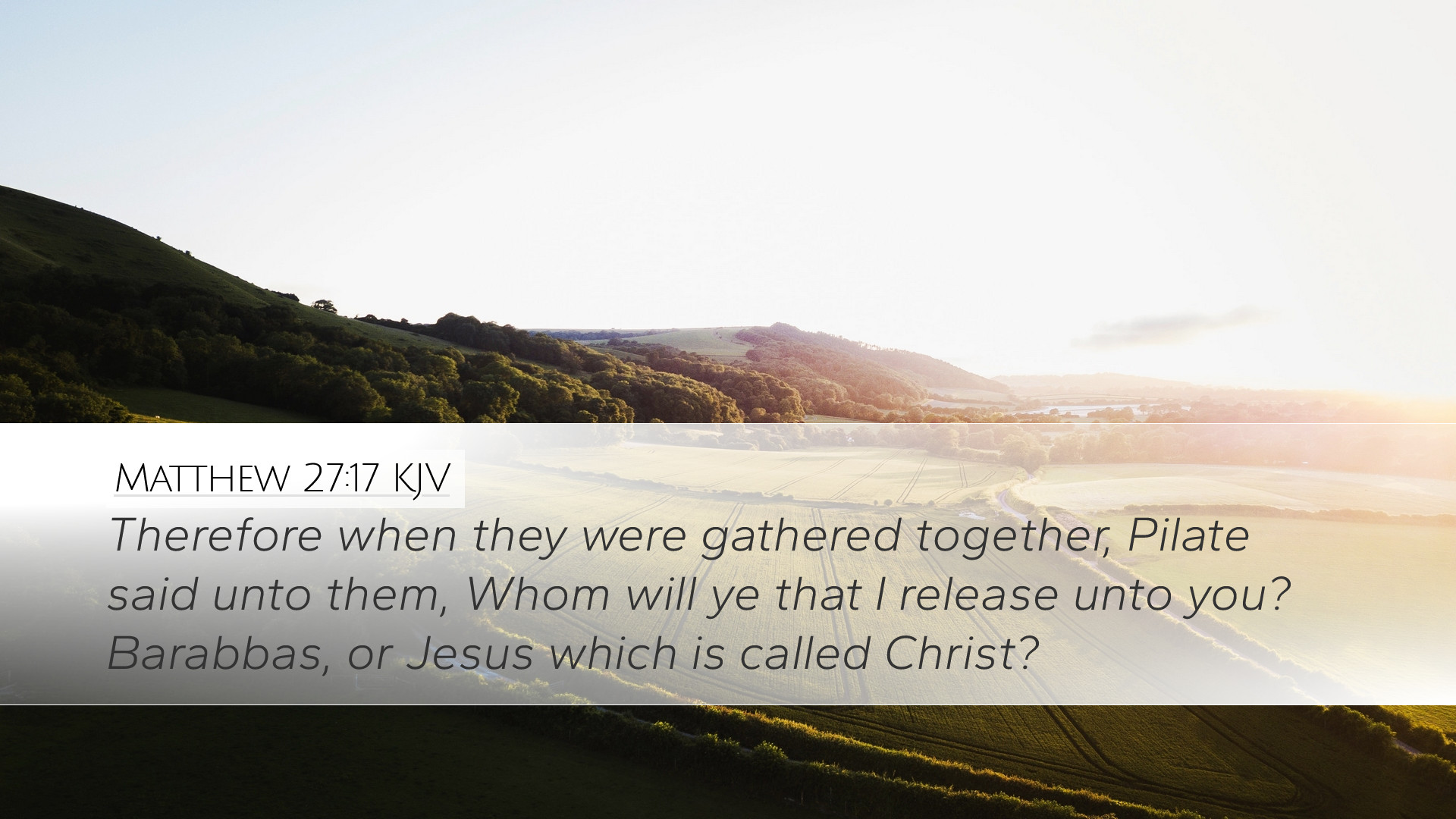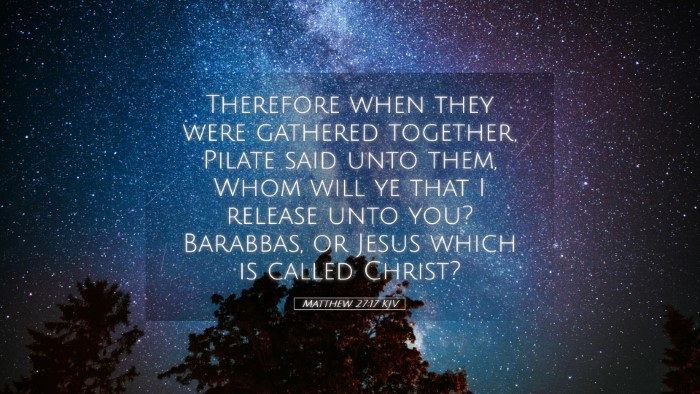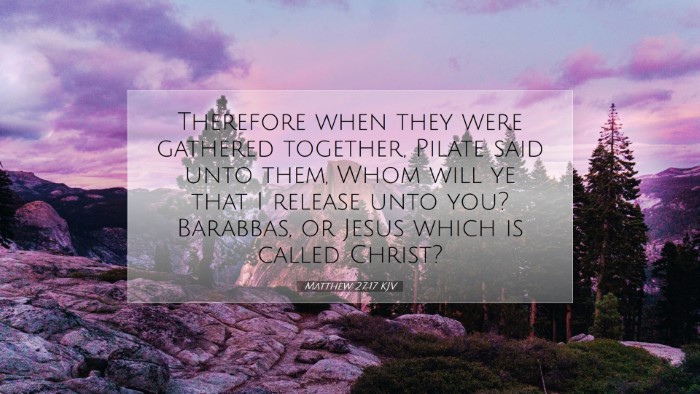Commentary on Matthew 27:17
Bible Verse: "Therefore when they had gathered together, Pilate said to them, 'Whom do you want me to release to you? Barabbas or Jesus who is called Christ?'" (Matthew 27:17, NKJV)
Introduction
The scene depicted in Matthew 27:17 captures a pivotal moment in the Passion narrative of Jesus Christ. This verse emerges as Pilate, the Roman governor, presents the choice between the criminal Barabbas and Jesus to the gathered crowd. This choice not only reveals the political dynamics of the time but also lays the groundwork for the theological implications of Christ’s sacrifice. Notably, various scholars have examined this passage to unearth its rich meanings.
Historical Context
In the context of the first-century Jewish society under Roman rule, we see a delicate balance of power. The Jewish leaders sought to eliminate Jesus, whom they viewed as a threat, while Pilate aimed to maintain peace and order. The tradition of releasing a prisoner during Passover provided a unique setting for this momentous choice.
Public Domain Commentaries
Matthew Henry's Commentary
Matthew Henry highlights the injustice of this moment. He notes that Pilate tried to evade responsibility by placing the decision in the hands of the people, emphasizing the moral degradation of choosing a known criminal over an innocent man. Henry reflects on the profound irony: the crowd, who had praised Jesus just days prior, now demanded His crucifixion. This choice symbolizes the rejection of Christ as the Savior.
Albert Barnes' Notes on the Bible
Barnes examines the significance of Barabbas's name, which means "son of the father." He contrasts Barabbas, a literal son of a father, with Jesus, who is the Son of God. This stark juxtaposition illustrates the choice between earthly deliverance and divine salvation. Barnes also discusses the political maneuvering of Pilate, who hoped to absolve himself by invoking public opinion. He notes that in doing so, Pilate not only misjudged the people but also facilitated the unfolding of God’s redemptive plan.
Adam Clarke’s Commentary
Adam Clarke delves into the deeper implications of the crowd's choice. He points out that Barabbas represents sin and rebellion, while Jesus embodies purity and righteousness. Clarke emphasizes that the decision reflects humanity’s tendency to choose temporal satisfaction over eternal truth. He also contemplates the role of divine providence, suggesting that this moment fulfills prophecy and underscores God’s ultimate control over events. The choice serves to illustrate mankind’s collective sinfulness, as they systematically aligned with evil.
Theological Reflections
This verse encapsulates essential theological themes that resonate throughout Scripture. The exchange between Barabbas and Jesus serves as a powerful metaphor for substitutionary atonement. Just as Barabbas was set free at the expense of Jesus, so too are believers liberated from sin through Christ’s sacrificial death.
Redemption and Substitution
In the choice offered by Pilate, we see a reflection of humanity's need for redemption. Just as Barabbas, a criminal, was released, so too are sinners offered grace through Christ. This act of substitution foreshadows the deeper spiritual truth that Jesus bore the penalty of sin on behalf of humanity, effectively delivering the righteous from judgment.
Human Agency and Divine Sovereignty
The psychology of the crowd and their decision brings forth questions of human agency in relation to divine sovereignty. Pilate’s actions and the crowd’s choices were not detached; they were part of God’s sovereign plan. This mystery invites believers to grapple with the balance of free will and divine foreknowledge, reiterating that even through human rebellion, God can accomplish His ultimate purposes.
Practical Applications
For pastors and theologians, several applications arise from Matthew 27:17:
- Preaching the Gospel: The narrative provides a compelling illustration of humanity's choice between sin and salvation, offering a poignant message of grace.
- Understanding Human Nature: Reflecting on the crowd’s fickleness encourages believers to remain steadfast in their commitment to Christ amidst cultural pressures.
- Emphasizing Accountability: Pilate’s attempt to pass the buck serves as a reminder of the spiritual accountability each person holds when confronted with the truth of Jesus.
Conclusion
Matthew 27:17 lays bare the reality of human choices in the face of divine grace. As Pilate presented Barabbas and Jesus to the people, he inadvertently highlighted the monumental decision that would shape the course of history. The rejection of Christ in favor of a criminal reflects the depths of human depravity, yet it also reveals the profound nature of God's redemptive love. Through this lens, we are called to proclaim the truth of the Gospel, recognizing that every choice carries eternal consequences.


